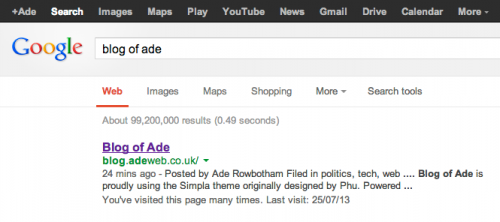
If you work in, around and underneath websites for a living it's likely (and indeed desirable) that you'll become acclimatised to using a lot of technical terminology and acronyms. But it's easy to lose touch with how much of that people outside the industry actually understand.
Jargon has its place but I'll actively try to avoid using any terms that I think might be lost on my audience in any given situation. I've always hated it when 'techies' appear to be trying to impress people by blinding them with science, and I never want to be that guy. So when talking to clients I often find myself treading that fine line between confusing and patronising them, constantly tweaking the tech-level to ensure that they're still with me.
This of course means I have to make some assumptions: "They'll probably know what X is, but I'd better briefly explain Y". But occasionally I'm way off, as happened the other day.
I recently made a site for a work acquaintance of my wife – just a small job for a local business. I knew it was likely that this client would be near at the non-technical end of the spectrum but I wasn't prepared for one phone conversation in particular, and it took me a while to figure out what they were doing wrong.
The site has a very simple and stripped back CMS content management system that allows them to add, edit or remove products, and I'd given them printed instructions for getting into the system, which went along the lines of:
- Sign in by going to: http://www.site.com/admin-area
- Enter your username: XXXXXX
- Enter your password: YYYYYY (case sensitive)
- Click the 'Enter' button
And I'd done a face-to-face demo.
A week after handing over the instructions I received a message asking me to call urgently because they couldn't get into the admin system. Digging for a more specifics I asked them what browser they were using, though judging from the 'Umm...' response I may as well have asked them what their subnet mask was.
OK, no problem. I think I recall they have IE9 on their laptop. That should be fine.
And then they said "The admin page isn't showing up, nor is the contact page actually". That was weird. I fired up a Windows / IE9 image in VirtualBox and loaded up the site. Sure enough, 'Contact us' was there on the menu and it linked correctly to the 'Contact us' page (of course there wasn't supposed to be a public link the admin area but hey we'd get to that).
"Really? You mean you can't see the contact page at all?"
"No, it's only showing home and the about us page."
Then the penny dropped – they were going to a search engine instead of typing the address in. They were talking about which pages were showing up in the search results.
I explained that they needed to type in the link exactly as I had printed it into the address bar, but the term 'Address bar' was apparently unfamiliar technical jargon to them.
Finally, after advising that they include "...the 'http' bit. Yes, with the colon, and yes the two slashes as well", we got there and they were away.
Good.
Now I'm a big fan of the unified search and address bar that's been adopted across all the major desktop browsers. But thinking about it, it appeared first in Chrome and what Google wants is obviously more traffic to Google.com. The unified search bar surely delivers this. Increasingly people get to places via search even if they already know the URL because Google is so fast that it's still quicker than typing in the full address. That's fine, I do it myself.
But this has also dumbed down the user experience to the point that that I fear the notion of a website's address – for some – may never register on their jargon chart. "You just go to Google".
It worries me that there are people who frequently use the web yet do not know what a URL is. And that there's a real confusion around what Google (et al) actually is and what it does. Near enough all of us use it so we really ought to know – at least at some basic level – what is going on.
And – it wasn't the point of the post but as a side-note – ignorance affects the likelihood of certain Government schemes getting the green light. A recent Daily Mail front page (which must have been in the print edition-only as I can't find it online) declared in intentionally loose language words to the effect of 'Google refuses to remove child porn from the internet'. I believe that a not insignificant amount of people actually think that because you go to Google and then it shows you a list of websites, when you click on one of the results the website comes back to you in some way from or through Google. This failure to grasp even the basics is worrying and dangerous given what a powerful political and social tool the web has become.